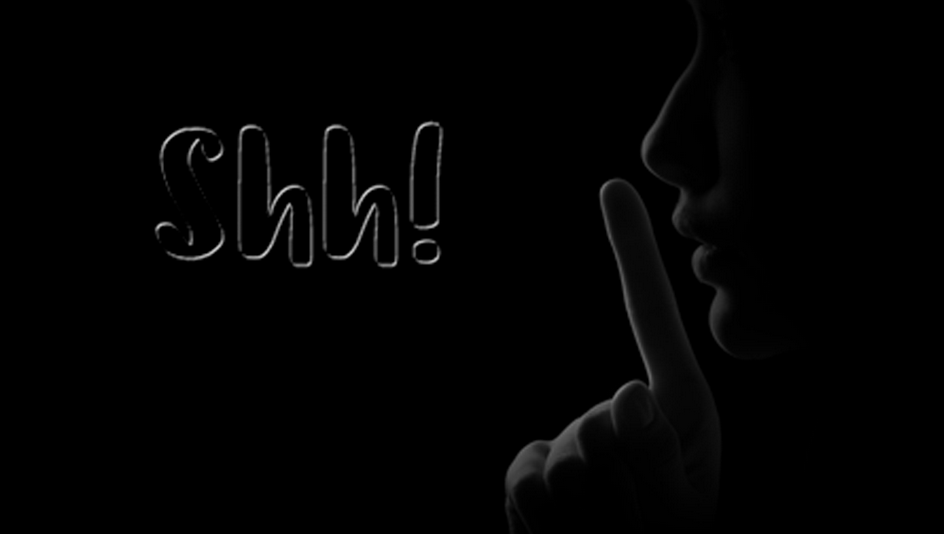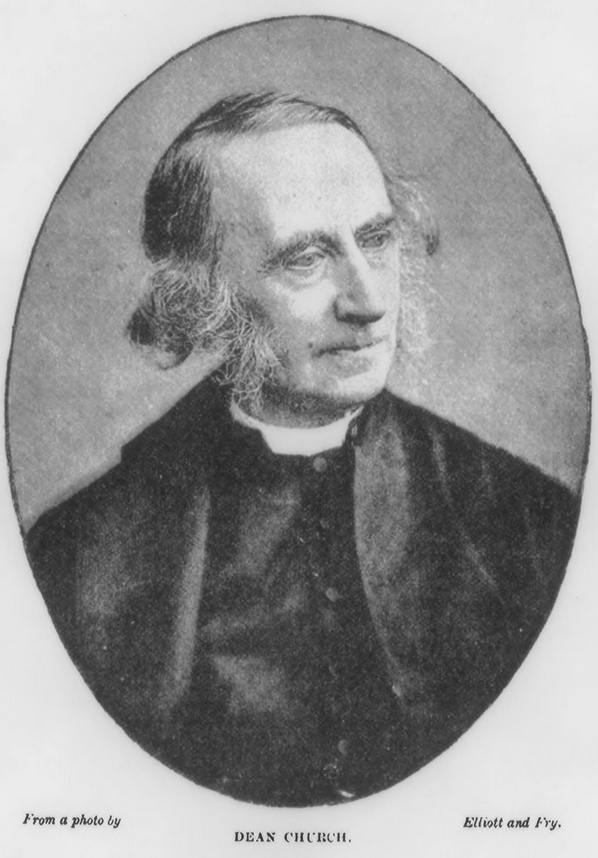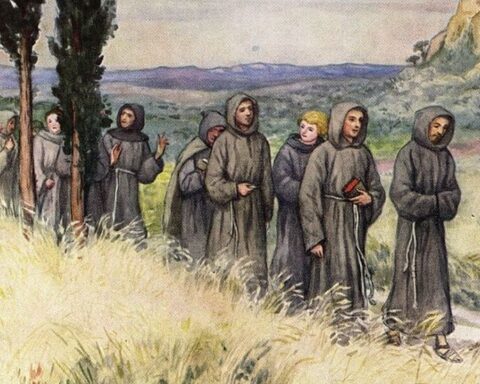
Editor’s note: The following is extracted from Village Sermons Preached at Whatley, by R. W. Church (published 1892).
______________________________________________________________________
“Therefore judge nothing before the time, until the Lord come, who both will bring to light the hidden
things of darkness, and will make manifest the counsels of the hearts.” — I Corinthians iv. 5. 4
______________________________________________________________________
The Bible teaches us that there is to be, not only a day of judgment, but a day of making known all secrets, and bringing to light all hidden things. When our Lord comes back it will be, not only to reckon with His servants, not only to pass the ever lasting sentence on all that we have done, but to show what has been in all hearts and thoughts, and to take away the veil of darkness, which covers so many things in our lives from the knowledge of all the world. We all of us have our secrets: and we must be prepared one day to give them up. “For there is nothing covered, that shall not be revealed; neither hid, that shall not be known. Therefore whatsoever ye have spoken in darkness shall be heard in the light; and that which ye have spoken in the ear in closets shall be proclaimed upon the house tops.” These are the words of Christ, and they are repeated over and over again. And St. Paul is constantly reminding us of the same thing. It is not only that every one of us “shall give account of himself to God.” It is not only that “we shall all stand before the judgment seat of Christ.” It is not only that “God will render to every man according to his deeds.” But it is also that “God, in that day, shall judge the secrets of men by Jesus Christ, according to my Gospel.” ” Some men’s sins,” he says, “are open beforehand, going before to judgment, and some men they follow after. Likewise also the good works of some are manifest beforehand; and they that are otherwise cannot be hid.” That is, not only, nothing, good or bad, but is to come under God’s judgment; but nothing, whether open or hidden, notorious or unknown, but, in that day, is to be published.
Now it is impossible for us, at present, to understand or imagine what all this making known of secrets will be like, and how it will be done. And it is no use trying to fancy anything about it. All we can be sure of is, that it will be something very different from what we can conceive of now. But the thing itself is certain; the thing itself is plain enough. There is no difficulty in understanding what is meant by bringing to light the hidden things of darkness, and drawing away the veil from all secrets of men. — We know what it is when something which we wish to hide is found out. We know what it is when something which we have wished to keep in the deepest darkness gets abroad, and is in everyone’s mouth. Now this is what the Bible tells us is to happen with all secrets in the day when the Lord comes to judgment. Secrets may be kept for a long time, but they cannot be kept forever. The day must come at last when they shall be known: we cannot tell by whom; but, at any rate, by those from whom people wished to hide them. Who are to be the witnesses of that great exposure, — before whom all our secrets are to be dragged into light and our souls laid bare, it is useless to guess. All we know is the awful fact, — the awfulness of which we can partly imagine by what we feel now, — that we shall have to give up everything that lies hid in our hearts and knowledge; that it will be impossible to hide anything, or keep it secret any longer; that if there is anything which we should be ashamed should be known, we shall no longer be able to help its being discovered and disclosed; that then every man will be seen as he is; the truth about everything will be made clear, the light will have poured in, brighter than the sun at noonday, on all dark places, and all dark things, and words.
One part of this great revealing of secrets will be the discovery of men’s real character, the making known what each man really is. Now, this is only half known. We think that we are something or other; and other people think of us according to their views. But all the time we are what we are in the eyes of God; that which God sees us to be, that we are, whatever different thing we may fancy of ourselves, or others may fancy of us. Now, we mistake about ourselves; and do not know what our neighbours have found out about us. We think ourselves one thing; they, with their sharper eyes, or more impartial judgment, see that we are another. We, perhaps, think ourselves humble; they see that we are vain. We think, perhaps, that religion is the main thing in all we do; they see that, behind all our religion, our actions are worldly and selfish.
They see that we are cowardly, and we fancy ourselves manly and brave. We never doubt that we are true: they see that we are slippery and insincere. They see that we are ill-natured and ill-tempered, while we never imagine that such a charge can be made against us. We dream that we are full of zeal for something altogether out of ourselves, while they see clearly that we are all the while following our own spirit, and seeking our own ends. We do not half know ourselves; but in some things, perhaps, we know ourselves only too well. We know, perhaps, that we seem better than we really are. There are ways of thinking and feeling in our hearts which we keep in the background, which we know will not bear the light, which we do our best to make a secret of: — ways and feelings which we indulge in, and which yet we know are unchristian and wrong: — ways and feelings with which if any one were to charge us, we should be very angry, but yet which we cannot make up our minds to struggle against and conquer and give up; which we hope and try that men shall know as little as possible about, but which, between God and our conscience, we know are too deeply part of ourselves.
Now, to all this the day of the Lord shall put an end. Then, all mistakes, all disguises, will be at an end. We shall be forced to know and see what we really are. If we are conceited, and selfish, and self- indulgent, and untrue, we shall be made to know it. We shall see ourselves as we have looked to other eyes. And all those secret faults and sins which we have, perhaps, taken so much trouble to wrap up and hide, which we have known of ourselves, but hoped that no one else suspected, — these, too, must be shown in their true light. We must for once — we must at last — be seen as we are. We shall feel that wilful blindness to ourselves, that all shows and pretendings, are at an end. Our real character will be made clear. The truth about us will have to come out. As Almighty God knows us, so we shall, at last, know ourselves, and so we shall be known by all who then see us.
This must be one part of that great revealing of secrets: the “making manifest the counsels of the hearts.” But the Bible speaks more distinctly and pointedly of another — the bringing to light not merely the general character of men, but particularly certain secrets which especially avoid the light, the “hidden things of darkness.”
What does the Bible mean by that? Can it mean anything less than this, that the veil which now rests on so many secret sins of men, the veil which in this world it is possible to keep drawn over them, even to the grave, that veil will then be torn asunder, and all those secret sins will then be as manifestly displayed as the most public sins that were ever committed — the sin of Pharaoh, of Saul, or of Judas Iscariot?
Think what this means. We know what it is to stand convicted of some public sin which a man cannot deny. We know, in the case of others, what is the horror, the confusion, the miserable shame of such a sinner, when his sin is brought home to him. But the righteous sentence of God makes no difference in the end between public and secret sins. The difference between public and secret sins is a very real difference now. But the Bible warns us that it is merely a difference for the few years of our life, and that as soon as life here is over, it comes at once to an end. There are no secret sins to God. There will be no secret sins in the day of judgment. All sins then will be so far on a level, that all will be known just as they were done. All will be made known. All will be made manifest in the brightness of that day.
Is this so? Is it indeed true that the most hidden things of darkness must at last be made plain, the darkest secrets of men’s sins be made known? Could anyone reasonably expect that it would be otherwise, if God is all-seeing and righteous? Why should sin, because it is secret for a time, be spared the shame and punishment of being brought to light? But we are not left to guess. The words of the Bible which tell us of the coming of our Lord to judgment, tell us as plainly that He comes “to bring to light the hidden things of darkness, and to make manifest the counsels of the hearts.”
And if it must be so, if all secrets must at last be known, the prospect is a serious one, for all who have a witness within them, that among the secrets to be revealed in that day will be found some of their own. I am not speaking now of innocent secrets; of the many numberless things which we naturally and rightly wish to keep to ourselves — and, from no wrong feeling, would be ashamed and distressed that others should know. It is not of these that the Bible speaks, when it speaks of the “hidden things of darkness.” It speaks of sin, of what has been done wrong: it speaks of what men keep secret, and blush at, because they know that they have done wrong. If we have any secrets of this kind, — sins which we have been able to keep from being known; sins which we, in a sort of way, triumph in, as being certain that they can never come to light in this world; sins into whose mystery we need fear no one ever breaking; sins which we need never talk about, or fear any one asking of; — if we have any of these secrets, these are the secrets of which the Bible speaks, as doomed to be made known; these are the secrets which we must one day meet again before an eye which none can avoid.
For these secrets are those hidden works of darkness of which it is said that Christ is to come back to bring them to light. There can be but one way to escape this terrible revealing of our secrets. There can be but one ground of hope that they may at last be buried, and brought against us no more. If they are repented of here; if here, where we have done them, we in truth forsake them; if here, where we have dared God’s eye and God’s judgment, and trusted that what man did not know of, no one would ever know of; if here, where we have triumphed in our secrets, we confess them with all our hearts to God; if here, where we have flattered ourselves that we are safe, and masters of our secret, we feel and own the wickedness and shame of our secret sins; — we may hope that they may be forgiven and taken away; and we may hope that what Christ has forgiven, He will not bring up against us to our confusion in the day of judgment. But, till we have repented of them, — as long as they are a secret between us and our conscience, and we feel comfort able only because they are not known to man, — so long we must lay our account to meet them once more, where there is no hiding them.
And how should this thought of the discovery of all hidden things of darkness restrain our thoughts and actions? Oh, let us not make to ourselves any of these dreadful secrets of sin, which we would almost rather die than man should find out, but which, after all, must be found out, and laid bare at last. When we are tempted, and are doubtful, let us say to ourselves, This must all come to light at last: am I prepared to face the disclosure? dare I do it, with the certainty of all being one day known?
Oh, let us have no secrets with God. Let us live with our life and conscience all day long open before Him. Let the secret sins of our past days be no forgotten or dissembled matters between us and God. Let us be sure that, if there is anything of which we feel that we dare not think of it and God together, dare not think of it and of its one day being made known, — this is a warning that we had best have nothing to do with it. Let us live with the most certain law of God’s kingdom ever before our thoughts: “There is nothing covered, that shall not be revealed”; ” nothing is secret, that shall not be made manifest; neither anything hid, that shall not be known and come abroad.”


Sermon: The Disclosing of Secrets
Latest from Religion

The Weimar Years – Part 1
This started out as an attempt to better understand Weimar Germany by chronicling my reactions to the audiobook version of “The Weimar Years: Rise and Fall 1918-1933” by Frank McDonough. Writing my

Alfredus Rex Fundator
"Alfred was a Christian hero, and in his Christianity he found the force which bore him, through calamity apparently hopeless, to victory and happiness."

The Story of Cortez
It seemed to me that, having to speak tonight to soldiers, that I ought to speak about soldiers. Some story, I thought, about your own profession would please you most and teach

The Coming of the Friars
When King Richard of England, whom men call the Lion-hearted, was wasting his time at Messina, after his boisterous fashion, in the winter of 1190, he heard of the fame of Abbot

“Joseph” by Charles Kingsley
Editor’s note: The following is extracted from The Works of Charles Kingsley, Vol. 25 (published 1885). (Preached on the Sunday before the Wedding of the Prince of Wales. March 8th, third Sunday



